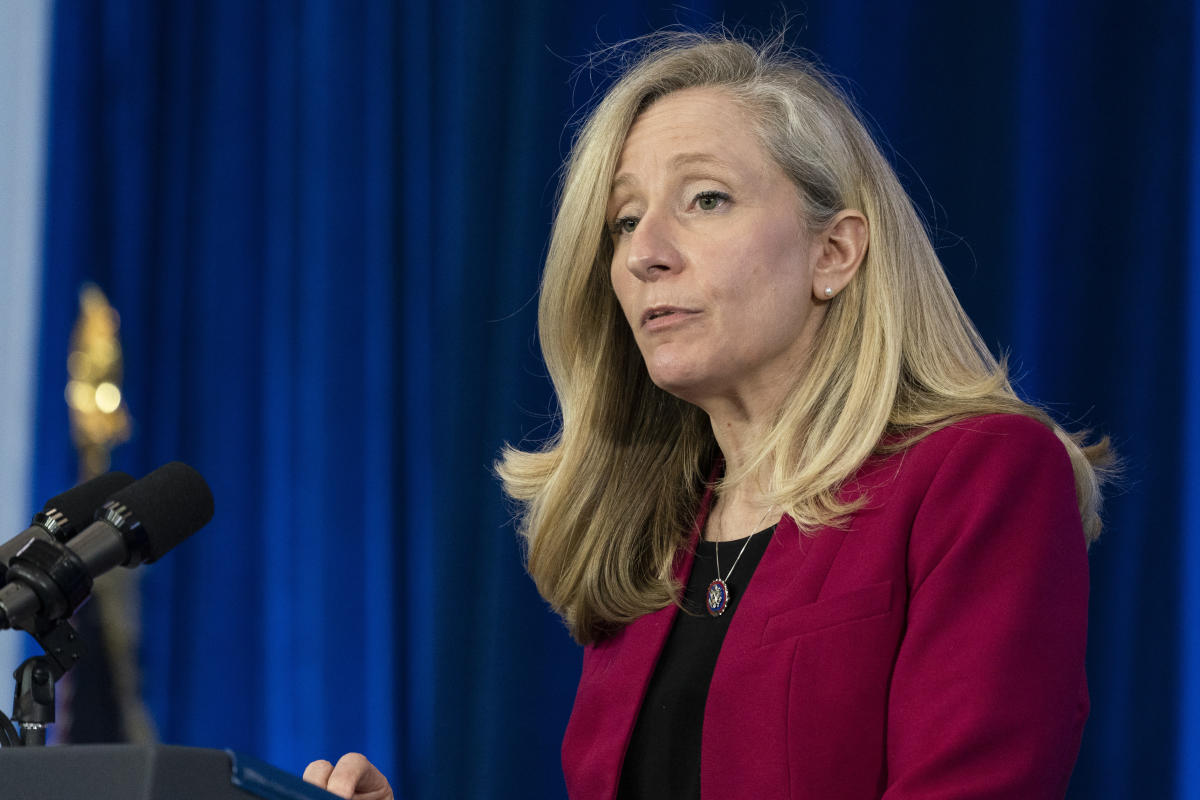
NEW YORK (AP) — As he prepares for a daunting reelection fight in the sprawling New Jersey suburbs, Democratic Rep. Tom Malinowski points to the Jan. 6 insurrection at the U.S. Capitol and argues that Republican control of Congress could fuel further extremism in politics.
In Malinowski’s telling, state Sen. Tom Kean Jr., his likely GOP opponent, is a “coward” for declining to say publicly whether he agrees with the Republican National Committee’s description of the violence at the Capitol as “ legitimate political discourse.”
“That will certainly be a theme,” he said of the campaign.
Two hundred miles to the south, another endangered Democrat, Rep. Abigail Spanberger of Virginia, says voters regularly approach her about the Capitol violence. But she isn’t sure that it will be a major theme in her campaign ads this fall.
“Who knows? At this point is it in the plan? No,” Spanberger said, adding that she’s focusing on the economy.
With Democrats defending narrow majorities in Congress, the divergent paths reflect a challenge facing the party as the House committee investigating the insurrection begins prime-time public hearings on Thursday. Some lawmakers and fresh candidates view this as an invaluable moment to refocus the public’s attention on the violence that day — and what they consider persistent threats to democracy. But polling shows voters are more interested in personal issues like surging grocery and gas prices.
Last year’s governor’s race in Virginia could serve as a warning sign for Democrats eager to tie their Republican opponents to the attack on the Capitol.
Democrat Terry McAuliffe’s messages to voters often incorporated former President Donald Trump and his role in sparking the insurrection. He ran television ads featuring grainy images of the Capitol assault accompanied by video of Virginia Republicans pledging allegiance to a flag carried at the attack.
Yet in a state that President Joe Biden carried by 10 percentage points, McAuliffe lost by two points.
Former McAuliffe campaign aide Christina Freundlich insists the Jan. 6 focus was an “important piece of the Trump puzzle” that helped energize Democrats, particularly in a state just across the Potomac River from the Capitol. But she questioned whether Democrats in other states should rely on the strategy.
“Frankly, I don’t know how effective that’s going to be somewhere else,” Freundlich said.
Despite such concerns, some Democrats and their allies plan to go forward with an election-year message highlighting the insurrection. The Democratic Congressional Campaign Committee is considering spending money on advertising this fall specifically targeting Republicans who participated in the siege, declined to condemn it or promoted Trump’s lies about widespread voter fraud costing him the election.
Guy Cecil, chair of Priorities USA, a Democratic super PAC that has committed over $50 million, including digital ads in battleground states focused on Jan. 6, said it was a “false choice” to suggest the party had to pick between addressing economic concerns and highlighting what happened that day as part of a broader threat to democracy.
“It’s useful in terms of raising the stakes of the election and it’s also important for us to do it because this is the current and future Republican Party,” he said when asked about the hearings during a briefing call with reporters Tuesday. “What happened on Jan. 6 and the ongoing efforts to minimize it — to in some cases defend it — is part of, I think an extreme agenda on the part of the party.”
More than two dozen Republicans now running for state or federal office took part in Washington protests that day as Trump’s supporters violently stormed the Capitol, trying to halt the transition of power. Some have faced charges. More assisted in efforts to overturn the results of the 2020 election at home.
Still others, such as the top Republicans in the June 21 primary in Spanberger’s district, have declared the violent episode was not an insurrection, though the event met the definition of that term.
Federal and state election officials and Trump’s own attorney general have said there is no credible evidence the election results were tainted. The former president’s allegations of fraud were also roundly rejected by courts, including by judges Trump appointed.
Still, some Republicans who are tied to such efforts are winning major statewide Republican primaries.
They include Doug Mastriano, Pennsylvania’s GOP nominee for governor, who was seen outside the Capitol on Jan. 6, spent thousands of dollars of campaign cash on charter buses ahead of the event, and was in regular communication with Trump as the then-president sought to deny Biden’s victory. If Mastriano wins in November, he would be in position to name the official who would oversee elections in the critical swing state.
For their part, Republicans say they are skeptical that the insurrection or the TV hearings will alter the political dynamics. Despite some concern that Mastriano may be too far outside the party’s mainstream, there’s been no sustained GOP effort to distance from him after his primary victory last month.
In New Jersey, Kean’s campaign manager, Dan Scharfenberger, said that Malinowski’s “coward” comment distracts from day-to-day economic concerns, including “that gas prices have doubled and seniors can’t afford their groceries.”
Rep. Tom Emmer, R-Minn., who chairs the House Republican campaign committee, dismissed the Jan. 6 panel as “a partisan witch hunt orchestrated by Nancy Pelosi.”
And Calvin Moore, the communications director for the Congressional Leadership Fund, a super PAC dedicated to electing Republicans in the House, said, “There’s way less awareness and concern among voters than there is inside the Beltway.”
Sarah Longwell, a Republican strategist who has conducted dozens of focus groups since the attack, agreed that Jan. 6 is currently “a low salience issue. It’s not the thing people bring up when you ask open-ended questions about how things are going in the country.”
But she also said the hearings offer Democrats an opportunity to change that if they can paint a broader picture of Republicans as too extreme on issues ranging from guns to abortion rights. That could be particularly helpful in states such as Arizona, where leading Republican candidates played key roles in trying to overturn Biden’s victory.
She pointed to 2010 when Republicans like Delaware Senate candidate Christine O’Donnell lost their general elections in what was otherwise a banner year for the GOP.
“Will Democrats figure out how to prosecute a case against Republicans on extremism and will these hearing raise the salience as a reminder of that extremism?” she said. “I do think the hearings have the potential to shift the conversation, but it has to be part of a broader effort to define the Republican Party as extremists.”
She added: “Jan. 6 can be part of a case you prosecute against Republicans, but you have to choose to prosecute it. It can’t prosecute itself.”
___ Associated Press writer Steve Peoples contributed to this report.




